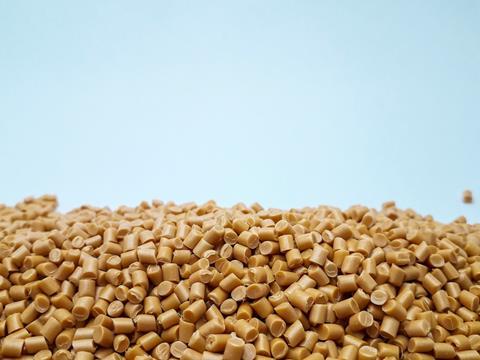
UBQ Materials has unveiled three biobased material replacements and additives and two modifiers in its Sustainability Product Portfolio – a range intended to help customers achieve such targets as increased post-consumer recycled content, reduced emissions, waste diversion, and circularity.
All the replacements and additives are based on UBQ’s globally patented waste-to-materials approach. Each aims to overcome common performance challenges faced while implementing sustainability-minded materials; they can be used as additives with a 10% to 30% load of UBQ-based material, or as material replacements when the load of UBQ-based material is higher (greater than 25%).
In either case, they are expected to help compounders and manufacturers identify the right load level to ascertain the appropriate load level with which to achieve both consistent functionality and enhanced sustainability.
UBQ ClimaPos is a biobased additive designed to unlock greenhouse gas removal and avoidance. In using it, companies are expected to meet or exceed their climate targets, as incorporating only 5% of the additive is said to bring a product’s carbon footprint to carbon neutrality.
Indeed, UBQ Materials suggests that the same proportion of any of its material replacements or additives can boost circularity or even achieve carbon-negative or climate-positive status, be it in a single product or across a wider supply chain.
Described as ‘climate-positive’, UBQ ClimaPos’ proven uses are listed as planters, pet carriers, transport boxes, and window profiles.
Meanwhile, the UBQ Q Series is a one-to-one material swap that blends with most polymers. It utilizes the UBQ standard material replacement and can be used in such industries as automotive and mobility, building and construction, and logistics and supply chain management applications.
The company also explains that, where final product characteristics permit, the material can be used on its own.
Additionally, the UBQ Industrial has been engineered as a reliable and functional material replacement in applications like shipping pallets in logistics and bitumen roofing or building infrastructure. It is thought to be a cost-effective option where functionality outweighs aesthetic appeal.
On top of these primary formulations, additional modifiers or enhancers can be applied in pursuit of additional properties, optimized product development, and improved certainty when it comes to manufacturing products.
Sustainability modifier UBQ Nclozur is formulated to mitigate odor. Its ideal applications are listed as automotive interiors, consumer products, flooring, footwear, carpet backing, and other indoor and interior applications.
Meanwhile, the UBQ Impact enhancer blends with various polymer matrices. In using it, businesses are expected to achieve circularity for a range of diverse applications, from decking to office furniture or car door mirrors, with the appropriate performance requirements.
UBQ Materials hopes that facilitating product designs with a range of load levels and capabilities will help companies phase out fossil-based plastics without compromising on their productivity goals. The company expresses its commitment to work alongside its compounding partners, value chain manufacturers, brand partners, and product development teams to customize application-specific formulations.
“For those already exploring material alternatives, the trade-offs between sustainability and product performance are well-known,” explained Patricia Mishic O’Brien, CCO of UBQ Materials. “Incorporating minimal amounts of UBQ can help businesses achieve a carbon-negative status, providing a win-win scenario for sustainability and business.
“Sustainability is becoming an imperative for customers. Businesses incorporating UBQ are gaining a market advantage, enabling them to hit their sustainability goals while maintaining or improving upon their pricing power.
“Sustainable product development has historically been hindered by material efficiency. Now compounders, product manufacturers and designers can focus on the upside opportunities of sustainability within their operations and product lines.
“Our priority is to provide a full spectrum of functional sustainability options, and we are confident that our new product lines will both benefit our customers and also drive substantial business growth for UBQ Materials in the future.”
Gil Felus, chief operations officer and chief innovation officer of UBQ Materials, added: “For years, we have worked with our customers through trials and application development. We’ve developed this portfolio to streamline the journey towards circular manufacturing practices. With this, sustainability to profitability becomes a simple equation.”
In a similar development, Tosaf has developed two new processing aids for the extrusion of fluoroelastomer-free polyolefins in order to create PFAS-free, certified food-safe plastic films.
BioPowder has also converted olive stone powders into additives said to offer a versatile, low-carbon alternative to conventional raw materials. They can be applied to a range of packaging solutions, including solid containers, transparent films, biobased adhesives, barrier coatings.
If you liked this article, you might also enjoy:
The Lidl approach to packaging sustainability
How did Brazil achieve its 100% aluminium can recycling rate – and can it be replicated in the EU?
Experts have their say on the EU’s Packaging and Packaging Waste Directive revisions
A deep dive into the most important packaging sustainability trends and solutions














No comments yet